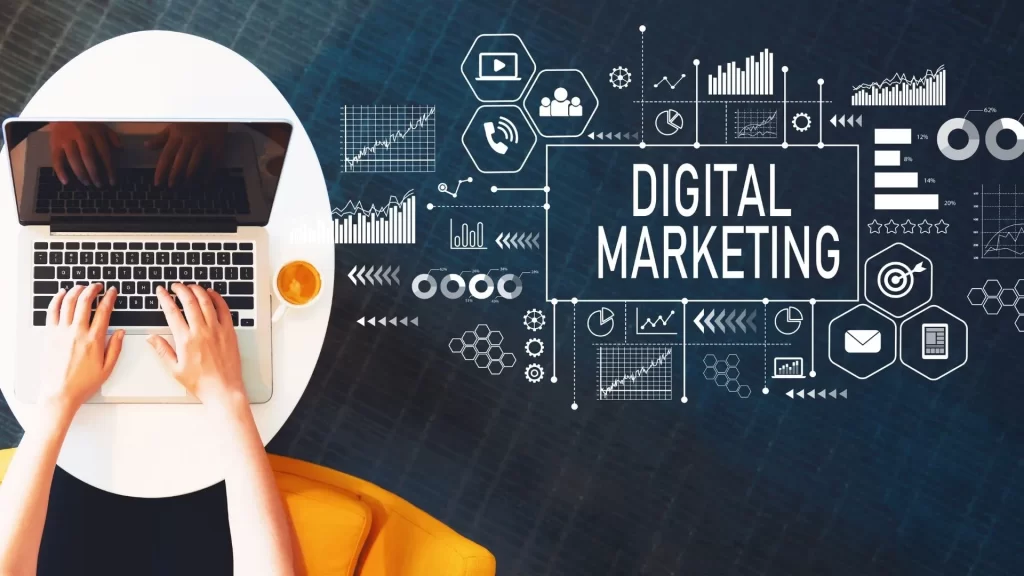What are the top 7 types of digital marketing?

Digital marketing is an ever-evolving field that encompasses various strategies and techniques to reach and engage with potential customers online. Understanding the different types of digital marketing can help businesses and individuals effectively promote their products or services. Here are the top 7 types of digital marketing:
Digital marketing is an ever-evolving field that encompasses various strategies and techniques to reach and engage with potential customers online. Understanding the different types of digital marketing can help businesses and individuals effectively promote their products or services. Here are the top 7 types of digital marketing:
1. Search Engine Optimization (SEO)
Search Engine Optimization (SEO) is the process of optimizing your website to improve its visibility on search engines like Google. The goal is to rank higher in search engine results pages (SERPs) for relevant keywords, making it easier for potential customers to find you. SEO involves both on-page and off-page techniques, including:
- On-Page SEO: This involves optimizing individual web pages by using relevant keywords, creating high-quality content, and improving the overall user experience. Key elements include meta tags, headings, and URL structure.
- Off-Page SEO: This focuses on building your website’s authority and trustworthiness through external efforts such as link-building, social media promotion, and influencer outreach.
Why It Matters: SEO is crucial because it drives organic traffic to your website. When done effectively, it can lead to increased brand visibility, credibility, and customer trust.
2. Content Marketing
Content Marketing involves creating and sharing valuable, relevant, and consistent content to attract and engage a target audience. The content can take various forms, such as blog posts, articles, videos, infographics, podcasts, and more.
- Blogging: Regularly publishing informative blog posts can help establish your brand as an authority in your industry and drive organic traffic to your website.
- Video Content: Platforms like YouTube and social media channels are excellent for sharing engaging video content, which can reach a wide audience.
- Infographics: These are visual representations of information or data, making complex topics easier to understand and shareable.
Why It Matters: Content marketing is key to building brand awareness, establishing authority, and nurturing customer relationships. It helps guide potential customers through the sales funnel by providing valuable information.
3. Social Media Marketing
Social Media Marketing involves using social media platforms to promote your brand, engage with your audience, and drive traffic to your website. Popular platforms include Facebook, Instagram, Twitter, LinkedIn, TikTok, and Pinterest.
- Organic Social Media: Creating and sharing content without paid promotion to build a community and engage with your audience.
- Paid Social Media: Running targeted ad campaigns to reach specific demographics and drive conversions.
Why It Matters: Social media marketing allows businesses to connect with their audience on a personal level, building brand loyalty and trust. It also provides valuable insights into customer preferences and behaviors.
4. Pay-Per-Click (PPC) Advertising
Pay-Per-Click (PPC) Advertising is a model where advertisers pay a fee each time their ad is clicked. It’s a way to buy visits to your site rather than earning them organically. Google Ads is one of the most popular PPC platforms.
- Search Ads: Appear on search engine results pages when users search for specific keywords.
- Display Ads: These are visual ads that appear on websites within Google’s Display Network.
- Social Media Ads: Platforms like Facebook and Instagram allow businesses to run targeted ads based on user demographics and interests.
Why It Matters: PPC advertising provides immediate visibility and can drive targeted traffic to your site quickly. It’s highly measurable, allowing you to track ROI and adjust campaigns as needed.
5. Email Marketing
Email Marketing involves sending targeted emails to a list of subscribers to promote products, share news, or nurture relationships. It’s a direct way to communicate with your audience and can be highly personalized.
- Newsletters: Regular updates sent to subscribers, providing valuable content, promotions, or company news.
- Automated Campaigns: Triggered emails based on user behavior, such as welcome emails or cart abandonment reminders.
Why It Matters: Email marketing remains one of the most cost-effective digital marketing strategies. It allows for direct communication with customers, driving engagement and conversion rates.
6. Affiliate Marketing
Affiliate Marketing is a performance-based marketing strategy where businesses reward affiliates for driving traffic or sales through their marketing efforts. Affiliates promote products or services through their channels and earn a commission for each sale or lead generated.
- Influencer Partnerships: Collaborating with influencers who promote your products to their audience.
- Bloggers and Content Creators: Affiliates create content around your products and include affiliate links.
Why It Matters: Affiliate marketing expands your reach by leveraging the audiences of affiliates. It’s a cost-effective way to increase sales and brand exposure.
7. Influencer Marketing
Influencer Marketing involves partnering with influencers who have a significant following on social media or other online platforms. Influencers can promote your products to their audience, increasing brand awareness and credibility.
- Micro-Influencers: Individuals with smaller but highly engaged audiences. They often have a more niche focus.
- Macro-Influencers: Individuals with larger followings who can reach a broader audience.
Why It Matters: Influencer marketing taps into the trust and authenticity influencers have with their audience, making it an effective way to reach potential customers.
Conclusion
Digital marketing offers a wide array of strategies to reach and engage with audiences online. By understanding and implementing these top 7 types of digital marketing, businesses can effectively promote their brand, drive traffic, and achieve their marketing goals. Whether it’s through SEO, content marketing, or social media, each strategy plays a crucial role in building a successful online presence.
Spot on with this write-up, I seriously feel this amazing site needs a great deal more attention. I’ll probably be returning to see more, thanks for the information!